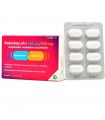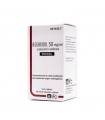- Vasodilator. Ginkgo leaves appear to improve cerebral and peripheral blood supply due to possible vasodilator and antiplatelet effects, improving the rheological properties of the blood.
The exact mechanism is unknown and what are the responsible active substances, although it is postulated that it could be flavonoids, such as quercetin, and terpenoids such as ginkgolids and bilobálides.
- Discontinue treatment at least 2 weeks before scheduled surgery at the risk of increasing bleeding time.
No specific problems have been reported in elderly people forcing a dosing readjustment.
- Warn your doctor and/or pharmacist if:
* Symptoms continue or worsen while using ginkgo.
* You will undergo surgery.
- Hypersensitivity to ginkgo or any other component of the medicine.
It does not appear to have significant effects.
Animal safety: no data available.
Human safety :adequate and well-controlled human studies are not available. It is recommended to avoid administration.
Effects on fertility :no specific human studies have been conducted.
"Nice stay"
- Improvement of age-related cognitive decline.
- Anticoagulants. Ginkgo may increase the risk of bleeding by combining it with anticoagulant or antiplatelet drugs.
Animal safety: no data available.
Safety in humans:it is not known whether it is excreted with milk, and the consequences it could have for the infant. It is recommended to avoid administration.
Safety and efficacy in children and adolescents < 18 years have not been evaluated, so it is recommended to avoid its use.
- Tablets: swallow without chewing with enough liquid. Don't lie down.
Food administration: administer separately from meals.
"Posology Tebofortan"
- Adults:
* Tebofortan 120 mg: 1 tablet 2 times a day, morning and evening.
* Tebofortan 240 mg: 1 tablet per day.
- Children and adolescents < 18 years: not recommended.
- Elderly: no specific dosage recommendations have been made.
Duration of treatment: at least 8 weeks. Discontinue treatment if no improvements are observed within 3 months.
Forgetting doses: administer the missed dose as soon as possible, unless there is little time to go until the next dose. Administer the next dose at the usual time. Do not double the next dose.
No specific dosing recommendations have been made.
No specific dosing recommendations have been made.
- [COAGULATION ALTERATIONS]. Ginkgo may increase the risk of bleeding, so caution is advised in patients with bleeding disorders or [HEMORRAGIA].
Discontinue treatment at least 2 weeks before surgery.
- [EPILEPSIA]. It cannot be ruled out that it could increase the risk of [CONVULSIONES].
- This medicine contains lactose. Patients with hereditary or gactose [LACTOSE INTOLERANCE], Lapp lactase insufficiency or glucose or galctose malaabsorption should not take this medicine.
Adverse reactions are usually mild and transient.
Adverse reactions are described according to each frequency interval, considered very common (>10%), common (1-10%), uncommon (0.1-1%), rare (0.01-0.1%), very rare (<0.01%) or of unknown frequency (cannot be estimated from the available data).
- Immune system disorders: unknown frequency [HYPERSENSITIVITY REACTIONS], with [ERYTHEMA] or [PRURITO].
- Nervous system disorders: unknown frequency [CEFALEA], [MAREO], [VERTIGO].
- Gastrointestinal disorders: unknown frequency [DIARREA], [ABDOMINAL PAIN], [NAUSEAS].
Symptoms: no cases have been reported.
Measures to be taken:
- Antidote: there is no specific antidote.
- General elimination measures: not described.
- Monitoring: clinical condition of the patient.
- Treatment: symptomatic.































